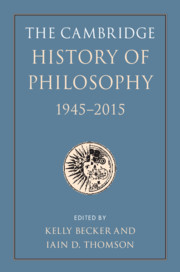Book contents
- The Cambridge History of Philosophy, 1945–2015
- The Cambridge History of Philosophy, 1945–2015
- Copyright page
- Contents
- Contributors
- Preface and Acknowledgments
- Introduction
- Part I Analytic Philosophy
- Part II Continental Philosophy
- Section Five Central Movements and Issues
- Section Six Continental Moral, Social, and Political Philosophy
- 33 The Concept of Autonomy in the History of the Frankfurt School
- 34 Emerging Ethics
- 35 Leo Strauss: Political Philosophy as First Philosophy
- 36 Critical Environmental Philosophy
- 37 Philosophy of Technology
- 38 Philosophy of Education and the “Education of Reason”
- Section Seven Continental Aesthetics and Philosophy of Religion
- Part III Bridge Builders, Border Crossers, Synthesizers, and Comparative Philosophy
- Part IV Epilogue: On the Philosophy of the History of Philosophy
- References
- Index
34 - Emerging Ethics
from Section Six - Continental Moral, Social, and Political Philosophy
Published online by Cambridge University Press: 08 November 2019
- The Cambridge History of Philosophy, 1945–2015
- The Cambridge History of Philosophy, 1945–2015
- Copyright page
- Contents
- Contributors
- Preface and Acknowledgments
- Introduction
- Part I Analytic Philosophy
- Part II Continental Philosophy
- Section Five Central Movements and Issues
- Section Six Continental Moral, Social, and Political Philosophy
- 33 The Concept of Autonomy in the History of the Frankfurt School
- 34 Emerging Ethics
- 35 Leo Strauss: Political Philosophy as First Philosophy
- 36 Critical Environmental Philosophy
- 37 Philosophy of Technology
- 38 Philosophy of Education and the “Education of Reason”
- Section Seven Continental Aesthetics and Philosophy of Religion
- Part III Bridge Builders, Border Crossers, Synthesizers, and Comparative Philosophy
- Part IV Epilogue: On the Philosophy of the History of Philosophy
- References
- Index
Summary
The end of the Second World War saw the rise of a new strand of political conservatism rooted in a technocratic ideology.1 This ideology, exemplified by McCarthyism in the United States, perceived any serious social, political, or ethical critique of the established order as a grave danger to the status quo. The academy was not exempt from the effects of McCarthy-era repression. According to the philosopher John McCumber, the philosophical profession was particularly hard-hit by McCarthyism since many professional philosophers working in fields such as political economy, critical social theory, Marxism, and even some branches of ethics lost their academic positions. This purge of radicals from American universities impacted the kinds of research that were pursued and the kinds of questions that were posed (McCumber 2001; 2016). In ethics, the crackdown on left-leaning intellectuals shifted research paradigms away from concrete problems and made a largely apolitical interest in “metatheory” the dominant approach to moral philosophy.
- Type
- Chapter
- Information
- The Cambridge History of Philosophy, 1945–2015 , pp. 458 - 470Publisher: Cambridge University PressPrint publication year: 2019



